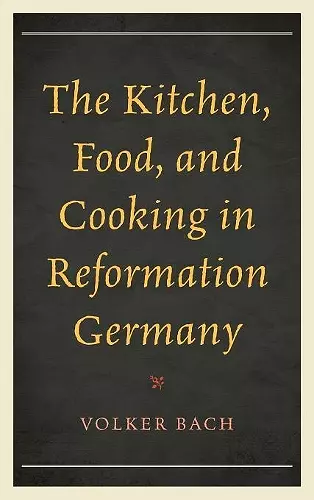The Kitchen, Food, and Cooking in Reformation Germany
Format:Hardback
Publisher:Bloomsbury Publishing PLC
Published:30th Sep '16
Currently unavailable, and unfortunately no date known when it will be back

In international culinary history, Germany is still largely a blank space, its unparalleled wealth of source material and large body of published research available only to readers of German. This books aims to give everybody else an overview of German foodways at a crucial juncture in its history. The Reformation era, broadly speaking from the Imperial Reforms of the 1480s to the beginning of the Thirty Years’ War, laid the foundations for many developments in German culture, language, and history, not least the notion of its existence as a country. Understanding the food traditions and habits of the time is important to anyone studying Germany’s culinary history and identity.
Using original source material, food production, processing and consumption are explored with a view to the social significance of food and the practicalities of feeding a growing population. Food habits across the social spectrum are presented, looking at the foodways of rich and poor in city and country. The study shows a foodscape richly differentiated by region, class, income, gender and religion, but united by a shared culinary identity that was just beginning to emerge. An appendix of recipes helps the reader gain an appreciation of the practical aspects of food in the age of Martin Luther.
Bach’s monograph is a valuable resource, both for those with a specific interest in culinary history and for historians of early modern Germany who seek to develop a fuller picture of the lives their subjects lived. It is perhaps a professional hazard for historians that, in our fascination with texts and ideas and laws, it can sometimes be tempting to forget that early modern Germans, from Luther and Charles V to peasants in Bavaria or Alsace, were fully embodied human beings. They engaged in the world around them not only with their minds but also with their senses, and Volker Bach’s book is an excellent way to gain insight into an important aspect of their everyday lived realities. Seasoned scholars and nonspecialists alike will find much of value in his work. * Renaissance and Reformation *
A much needed book: extremely clearly written, Volker Bach’s The Kitchen, Food, and Cooking in Reformation Germany sets the scene carefully and with much knowledge of general history. A thorough introduction for all food scholars, lucid, comprehensive and analytical, including an excellent selection of expertly translated and commented recipes that in themselves provide a very good introduction to the culinary world that is Volker Bach’s topic. Added bonus: an erudite glossary of culinary terms of the time as well as a list of further sources. Altogether not only highly recommended, but in my mind indispensable for food historians - would have saved me much research of my own while writing Beyond Bratwurst: a History of Food in Germany. -- Ursula Heinzelmann, Trustee Director of the Oxford Symposium on Food and Cookery and author of Beyond Bratwurst: a History of Food in Germany (London 2014)
An impressively researched book that brings together much primary source material previously unavailable to the English reader. This is an entertaining read that includes details about a wide array of aspects of Early Modern German eating habits, from everyday eating utensils to regional farming techniques to debates over gluttony and heavy drinking. The book is also notable for the inclusion of numerous recipes for foods ranging from bread to cabbage to cheese. Recommended for anyone interested in German food or the history of European foodways more generally. -- Alice Weinreb, Assistant Professor of History, Loyola University Chicago
ISBN: 9781442251274
Dimensions: 239mm x 156mm x 21mm
Weight: 481g
218 pages